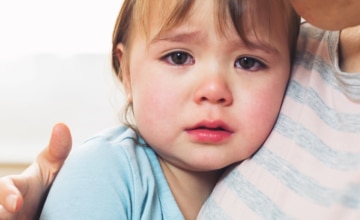Statement for the Record of Myra Jones-Taylor, Chief Policy Officer, ZERO TO THREE
Chairman Raskin, Ranking Member Roy, and Members of the Subcommittee:
On behalf of ZERO TO THREE, I want to express our deep appreciation to the Subcommittee for holding this hearing. Together with the Full Committee hearing on this topic on Friday, and the Full Committee hearing on child trauma in general on Thursday, this hearing helps keep the ongoing, unconscionable treatment of children at our country’s southern border in the consciousness of your colleagues and the public. In recent weeks, families, advocates, policymakers and Administration personnel have given us a window through the walls of the migrant detention camps, again focusing national attention on the lifealtering experiences of families with children crossing the border. As we learn more about the young children being held in detention, where they are separated from their families and there are reports of grossly inadequate care, ZERO TO THREE is compelled to reiterate what decades of research on child trauma clearly spell out about its impact on young children.
Quite simply, subjecting young children to detention, often combined with separation from trusted adults and unhealthy living conditions, is tantamount to child abuse and could lead to lifelong harm. When children are put in situations like those we are seeing at the border, stress hormones flood their brains, disrupting their neurological circuitry in ways that profoundly affect their short- and long-term physical and emotional health, and their ability to form relationships and learn.i The science tells us that every second of delay is a million neural connections undermined in a baby’s brain. Babies need our urgent attention and action now.
Babies develop and learn within the context of their earliest relationships and experiences with the trusted adults around them. As babies, the ways in which we are held, talked to, and cared for teaches us about who we are and how we are valued – experiences that profoundly shape the people we will become. These experiences and relationships influence the foundational brain architecture on which all later learning will rest.
The period of extraordinary development that takes place in the first three years of life is also one of great vulnerability. Infants and toddlers who do not receive the positive experiences they need for strong development in the first few years of life, who are stripped of the protective relationships and environments that can buffer them from adverse experiences, can rapidly fall behind. This is precisely the situation in which very young children at the border find themselves: the actions of representatives of the United States government are placing their early development and long-term wellbeing at grave risk.
There is a common misperception that babies are too young to be affected by the events around them—that they do not notice when they are separated from their parents who are at the center of their world and placed in the care of a stranger. In truth, at the very foundation of babies’ development, intense trauma almost inevitably creates physiological damage to their brains and emotional damage that they will carry into the future – particularly if their needs are not met appropriately and immediately. Out of deep concern for young children, families, and the future of our country, ZERO TO THREE remains in strong, informed opposition to any practice that causes trauma and long-term harm to children. As we apply our research-based lens to current immigration practices and debate, we have three priorities that we urge Congress to consider in formulating a response to this tragic situation:
Detention is not a humane or acceptable environment for babies and toddlers.
No amount of time in detention is safe for young children. Research has consistently shown that even a short amount of time in detention is harmful to children, particularly those who have already experienced trauma in their home countries or during their journey.ii Evaluations of children who have been detained, even with their families, reveal alarming outcomes for young children, with many displaying developmental delays and signs of emotional disturbance. The long-term harm of family detention on children is well known. Research has shown that children in detention are more susceptible to Post-Traumatic Stress Disorder (PTSD) symptoms as compared to adults.iii Further, researchers have found regressions in child development, suicide attempts, and high levels of anxiety and depression in children in detention.iv While even brief periods of detention impact children’s functioning, worsening mental health symptoms increase the longer a child is in detention.v
In addition, the contention that children are only temporarily being held in camps does not change the impact on their development. Sending infants and toddlers to institutional detention is detrimental to their health and well-being. This past month, there were reports of toddlers at the border without diapers and teenage mothers wearing clothing stained with breast milk, indicating that children, including babies, are not being provided basics of hygiene and care.vi Beyond these violations to basic needs, detention places children in an environment of confinement, deprivation of stimuli, and developmentally inappropriate and often harsh treatment, which cause severe stress for both the children and their caregivers. If there are no protections for children’s care, infants, toddlers and their families placed in detention facilities are entirely vulnerable to protracted, unlimited stays, abuse, and neglect.
Families who have been separated must be reunified immediately, and the practice of separating children from their parents must not continue.
While the practice of separating children from their families was prohibited over a year ago via an Executive Order, it is evident that this practice has continued. According to recent reports, very young children are still being placed in detention camps, even being removed from the trusted adults who care for them, and reportedly being turned over to unrelated older children, or border patrol agents for their care.vii
These children experience trauma twofold. First, children are separated from the trusted adults to whom they are attached. While the rapid and foundational development of infants and toddlers makes them particularly vulnerable to trauma, families offer an essential buffer to those experiences. When young children, particularly those under three, are separated from their parents after crossing the border, that primary bond is severed. This involuntary separation is traumatic and creates stress reactions that can be toxic to the developing brain. Then, this trauma is compounded when children are placed in the care of strangers that are, by all reports, ill-equipped to nurture their sense of safety, much less their healthy development. The broad consensus of researchers and practitioners is that to continue to separate families in this way is tantamount to child abuse.
The science of child development tells us that young children cannot be detained, with or without their families, without experiencing significant harm. Children must not be incarcerated, and those that have been separated from their families must be immediately reunited with their caregivers, providing them with the close relationship needed to cope with and recover from the trauma they have undergone. But this recovery requires expert support.
Young children who have been held in detention and/or have been separated from their families need access to voluntary infant and early childhood mental health services and support.
Further compounding the risks to their well-being, babies and their families who are in, or have experienced detention, may face inadequate access to services including the medical and mental health care they so desperately need. Children and families, babies and expectant mothers in particular, need specialized medical and mental health services in order to ensure healthy growth and development. Access to these types of specialized, individually tailored services is generally not possible in the context of detention, and the unlikelihood of appropriate mental health care applies particularly to infants and toddlers. The lack of access to care likely continues after detention without special efforts to connect children and families to appropriate services.
Decades of psychological and brain research have demonstrated that adverse experiences during this critical period of early childhood can have profound immediate and long-term harm on child development.viii This type of trauma, particularly when not addressed by an experienced and trusted clinician, has severe implications for both physical and emotional health over time, increasing young children’s risk for learning difficulties, problems forming relationships, and adult health problems. We underscore that the experience of detention itself will be the cause of much of this trauma, bringing with it short- and long-term harm.
Caregivers, who are also deeply psychologically and physiologically impacted by their recent experiences, also need specialized support to provide their young children with the care they need. When families have been separated, reunification itself may be difficult, as separated young children do not have the capacity to understand what has transpired and may feel abandoned by their parents. Reports have confirmed what Infant and Early Childhood Mental Health (IECMH) specialists knew to be true from the beginning – that families separated at the southern border report that their children are suffering deep emotional wounds.ix The experience of involuntary family separation is one that is incomprehensibly traumatic – for both the caregiver and the child. This is complex work, requiring a focus on both the parent and child, and requiring specialized expertise and developmentally appropriate, evidence-based support rooted in a deep understanding of IECMH.
Conclusion
Detention of young children at the border is unacceptable. As experts in early childhood development, we know that every second matters for the well-being of babies and toddlers, both now and in their future lives. Appropriate support and treatment is urgently needed, and time is truly of the essence for the protection and care of young children’s rapidly developing brains.
In accordance with internationally accepted child rights, immigrant and refugee children should be treated with dignity and respect and should not be exposed to conditions that may harm or traumatize them. The practice of detaining children directly contradicts those very principles. While we focus on young children, we also note the reports of horrific conditions for older children as well and deplore the treatment they receive that seems devoid of consideration of their humanity and vulnerability. For families with children, there are proven, cost-effective alternatives to detention that maintain family unity and protect the best interests of vulnerable children, including tested community-based case management programs. Most recently, in 2013, Lutheran Immigration and Refugee Services (LIRS) entered into an agreement with Immigration and Customs Enforcement (ICE) to screen vulnerable immigrants for release from detention and enrollment in LIRS’ Community Support Initiative. Between June 2013 and November 2014, 44 out of 46 formal referrals were in complete compliance – an appearance rate of 95.6%. These holistic programs that offer case management services, and facilitate access to legal counsel as well as safe, affordable housing have been shown to substantially increase program compliance without the extensive and expensive use of electronic monitoring.x
We cannot stress the urgency of this situation enough. Even if reports of reductions in numbers of children in Border Patrol detention facilities are true, the children seem to have melted away with no assurance that their mental and physical health needs have been, or will be, met. Accordingly, we urge measures that flood existing facilities with pediatric and mental health practitioners and ensure children who are transferred to the custody of the Department of Health and Human Services or reunited with family have access to similar services. We understand all too well the lack of awareness about infant and early childhood mental health needs and have developed a list of IECMH resources in every state. We urge the Congress and all Americans to demand that this inhumane treatment of babies, older children, and adults at the border cease, and the effective alternatives mentioned above be initiated.
As we examine the treatment of babies at the border, we must use what decades of science and research tell us to inform policy and practice decisions right now. Their future – and the best interests of our nation – depend on it. Thank you again for your time and commitment to infants, toddlers, and their families.
Sincerely,
Myra Jones-Taylor, Ph.D.
Chief Policy Officer, ZERO TO THREE
i National Scientific Council on the Developing Child. (2005/2014). Excessive Stress Disrupts the Architecture of the Developing Brain: Working Paper 3. Updated Edition. http://www.developingchild.harvard.edu
ii Mares, S. (2015). Fifteen years of detaining children who seek asylum in Australia – evidence and consequences.
Australasian Psychiatry, 24(1), 1-14. doi:10.1177/1039856215620029 iii Triggs, G. (2015). The Forgotten Children: National Inquiry into Children in Immigration Detention 2014. The Medical Journal of Australia, 202(11), 553-555. doi:10.5694/mja15.00551
iv Acer, E., Byrne, O. (2015). Family Detention: Still Happening, Still Damaging. Human Rights First.
v Mares, S. (2015). Fifteen years of detaining children who seek asylum in Australia – evidence and consequences. Australasian Psychiatry, 24(1), 1-14. doi:10.1177/1039856215620029
vi ‘There Is a Stench: Soiled Clothes and No Baths for Migrant Children at a Texas Center. (2019, June 25). Retrieved from https://www.nytimes.com/2019/06/21/us/migrant-children-border-soap.html
vii Ibid.
viii Felitti, V. J., Anda, R. F., Nordenberg, D., Williamson, D. F., Spitz, A. M., Edwards, V., Marks, J. S. (1998). Relationship of Childhood Abuse and Household Dysfunction to Many of the Leading Causes of Death in Adults. American Journal of Preventive Medicine, 14(4), 245-258. doi:10.1016/s0749-3797(98)00017-8
ix Immigrant families struggling with trauma of separation. (2018, September 7). Retrieved from https://www.apnews.com/cf1c03a8e9ae4969aa8e331862d6897b
x United States Government Accountability Office. (2014). Alternatives to Detention; Improved Data Collection and Analyses Needed to Better Assess Program Effectiveness. https://www.gao.gov/assets/670/66691




